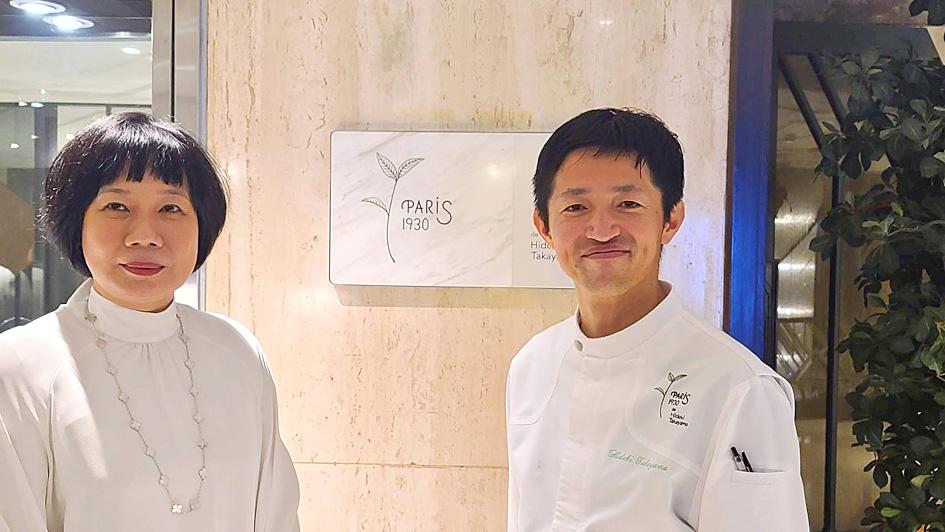Landis Taipei Hotel, the flagship property of Landis Hospitality Group (麗緻餐旅集團), is seeking to boost its food and beverage sales this year, in the hope that international travel restrictions might be lifted in the second half of the year, the company said yesterday.
“Our food and beverage business has proven to be resilient and recovered quickly from a COVID-19 slump last year, thanks to a strong, loyal clientele and fast adjustments in our operations,” Landis Group business development division assistant general manager Gary Lo (羅明威) said.
Last year’s food and beverage revenue remained at 2019 level, and might grow this year, as Taiwanese travel regularly and travel restrictions might be lifted in the fall, Lo said.

Photo: Wang Yi-hung, Taipei Times
The Michelin-starred Tien Hsiang Lo Restaurant in the five-star hotel is fully booked for Lunar New Year’s Eve on Feb. 11, despite cluster infection at a Taoyuan hospital, Lo said.
December to February is peak season for local restaurants and banquet facilities, which cater to corporate feasts and family reunions, he said.
While many companies and organizations have not held large event to reduce COVID-19 infection risks, the large number of smaller events helped business at the hotel’s restaurants, he added.
Business at the hotel’s Paris 1930 de Hideki Takayama restaurant picked up 30 percent last year from a year earlier thanks to its blend of creative French cuisine and Japanese elements, Lo said.
The hotel forecasts a 30 percent increase in packaged food sales this year, after a 50 percent rise last year, helped by the low-contact economy, he said.
However, hotel occupancy might remain low this year due to the Landis Taipei’s heavy dependence on foreign tourists, said Newman Yen (顏鎮國), general manager of the group’s hotel operations.
International travel might rebound in the second half, after a widespread rollout of COVID-19 vaccinations, he said.

TAKING STOCK: A Taiwanese cookware firm in Vietnam urged customers to assess inventory or place orders early so shipments can reach the US while tariffs are paused Taiwanese businesses in Vietnam are exploring alternatives after the White House imposed a 46 percent import duty on Vietnamese goods, following US President Donald Trump’s announcement of “reciprocal” tariffs on the US’ trading partners. Lo Shih-liang (羅世良), chairman of Brico Industry Co (裕茂工業), a Taiwanese company that manufactures cast iron cookware and stove components in Vietnam, said that more than 40 percent of his business was tied to the US market, describing the constant US policy shifts as an emotional roller coaster. “I work during the day and stay up all night watching the news. I’ve been following US news until 3am

UNCERTAINTY: Innolux activated a stringent supply chain management mechanism, as it did during the COVID-19 pandemic, to ensure optimal inventory levels for customers Flat-panel display makers AUO Corp (友達) and Innolux Corp (群創) yesterday said that about 12 to 20 percent of their display business is at risk of potential US tariffs and that they would relocate production or shipment destinations to mitigate the levies’ effects. US tariffs would have a direct impact of US$200 million on AUO’s revenue, company chairman Paul Peng (彭雙浪) told reporters on the sidelines of the Touch Taiwan trade show in Taipei yesterday. That would make up about 12 percent of the company’s overall revenue. To cope with the tariff uncertainty, AUO plans to allocate its production to manufacturing facilities in

Six years ago, LVMH’s billionaire CEO Bernard Arnault and US President Donald Trump cut the blue ribbon on a factory in rural Texas that would make designer handbags for Louis Vuitton, one of the world’s best-known luxury brands. However, since the high-profile opening, the factory has faced a host of problems limiting production, 11 former Louis Vuitton employees said. The site has consistently ranked among the worst-performing for Louis Vuitton globally, “significantly” underperforming other facilities, said three former Louis Vuitton workers and a senior industry source, who cited internal rankings shared with staff. The plant’s problems — which have not

TARIFF CONCERNS: The chipmaker cited global uncertainty from US tariffs and a weakening economic outlook, but said its Singapore expansion remains on track Vanguard International Semiconductor Corp (世界先進), a foundry service provider specializing in producing power management and display driver chips, yesterday withdrew its full-year revenue projection of moderate growth for this year, as escalating US tariff tensions raised uncertainty and concern about a potential economic recession. The Hsinchu-based chipmaker in February said revenues this year would grow mildly from last year based on improving supply chain inventory levels and market demand. At the time, it also anticipated gradual quarter revenue growth. However, the US’ sweeping tariff policy has upended the industry’s supply chains and weakened economic prospects for the world economy, it said. “Now